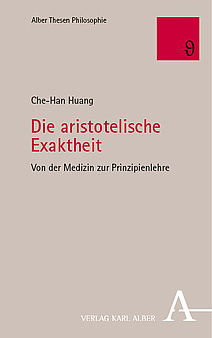englischThis book stems from a few impressions and ensuing considerations triggered by reading the pages of the “œuvre” of the theologian Franz C. Overbeck (1837–1905). The pages are above all those of his “Kirchenlexicon”, an extensive collection of reflections gathered for the purpose of carrying [...]
more informationenglischIn this book, the author tries to oppose the ‘methodologically pluralistic’ interpretation of Aristotle's philosophy, focusing on exactness (ἀκρίβεια) as a key term that demonstrates a consistent methodological concept as well as the unified systematics of Aristotle's theoria. The author [...]
more informationenglischThis study deals with the conceptual pair of ‘Erscheinung/Ding an sich’ (appearance/thing-in-itself) in Kant's philosophy and tries to reinterpret it. Previous interpretations have neglected the metaphysical critical intention of the three themes in Kant's critical philosophy: epistemology, [...]
more informationDie Leiblichkeit wird bei Emmanuel Levinas (1906-1995) in ihrer fundamentalen Bedeutung für die menschliche Subjektivität und für die Unmittelbarkeit der Beziehung zum Anderen dargestellt. Die Untersuchung bemüht sich um eine immanente Interpretation aus dem Levinasschen Denken heraus. Im [...]
more informationenglischWith his book, the author presents a nuanced and critical-constructive study of the "New Natural Law Theory", which has received little attention in German-speaking philosophy. However, it is certainly worthy of discussion, because it is not only systematically very demanding and [...]
more informationenglischThis monograph reveals basic structural parallels between the ideas of a good life in both Kierkegaard and Camus. Both authors share a range of metaphors on and concepts of experience of the negative, and both conceptualise a good life as not-fleeing, but without a positive concept. The [...]
more informationenglischIn an age of complex crises and problems, the question arises if our approach to our life-world, and our way to be, does actually fit to our existence in the right measure. In this book, it will be shown that Martin Heidegger already thought about the relation of measure and being throughout [...]
more informationenglischThis work analyses the interrelationship between the formation of a philosophical canon and the practice of editing, using the Akademie edition of Kant's writings as an example, and thus addresses a research desideratum. It focuses on the question of whether inner-philosophical discourses [...]
more informationenglischOur duty against ourselves is to live in such a way that a certain part of ourselves can agree to the life we live. This part of ourselves is our imagined future self. We owe to ourselves to protect our future self’s freedom from corruptions. This is possible if the very social dynamics [...]
more informationenglischThis book addresses the question of the nature and the immortality of the human soul in the context of Immanuel Hermann Fichte's philosophical anthropology. In particular, it undertakes a systematic and immanent reconstruction of Fichte's argument for the substantiality, individuality, [...]
more information










